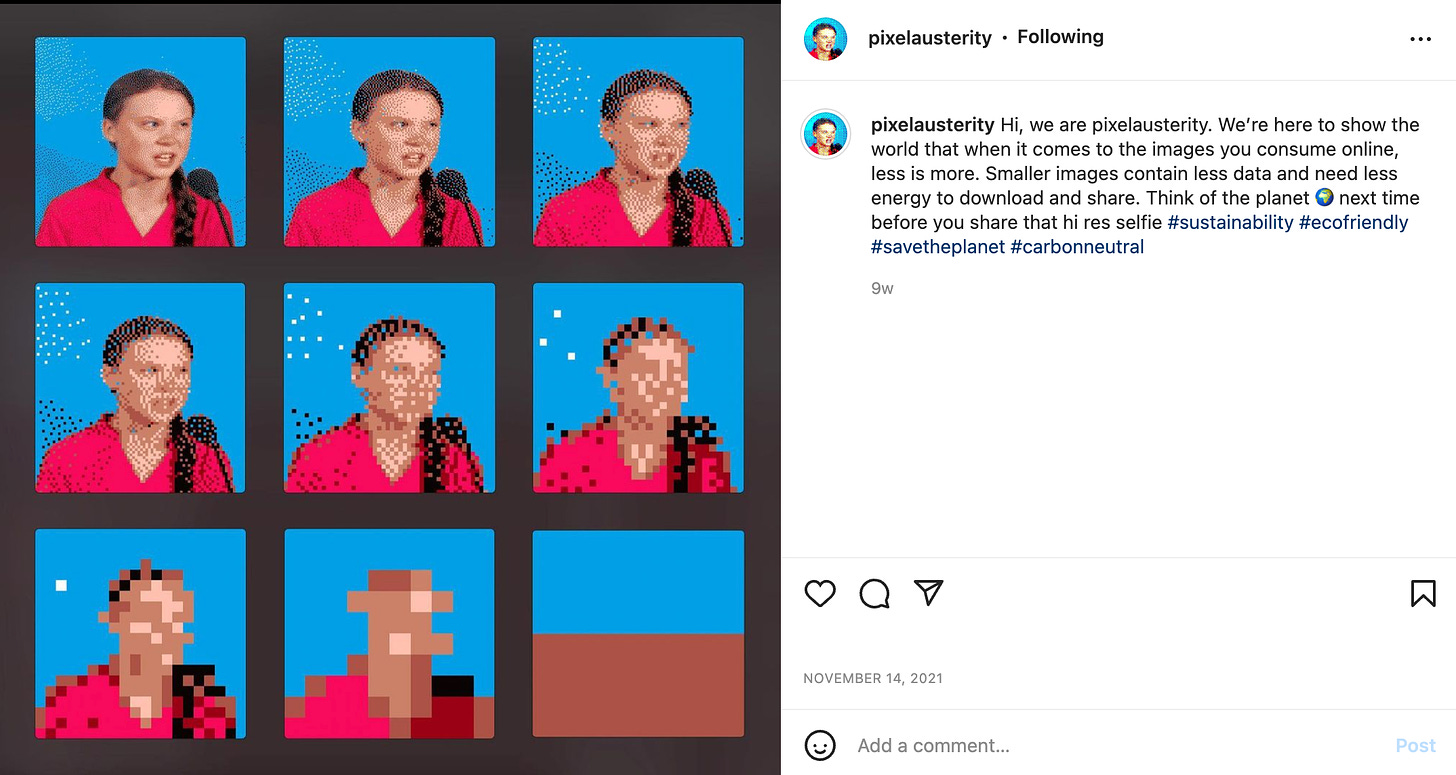Pixel Austerity: Brand Manifesto
PixelAusterity is an instagram account sharing Original Content (OC).
With a wide variety of posts, our movement addresses ways Climate-concerned users can affect their Online Carbon Footprint (OCF), particularly by applying a dithering noise filter to images in order to reduce the image file size. Pixel Austerity urges everyone to #dither their posts to make them less resource-intensive. Dithered posts feel intentionally ‘retro’. Their lo-fi aesthetic harkens back to a youthful world before energy-shortages and tech-monopolies. They feel greener, so they are greener. Dither, don’t litter!
When Japanese composer Ryuichi Sakamoto decided to sell the notes to his most beloved melody “Merry Christmas, Mr. Lawrence” as an NFT, his fandom erupted with outrage – how could such a legendary artist capitalize on his art in such a wasteful high-pixel and high-bit-depth format? How could a musical minimalist become such a digital maximalist? We heard you. In response, we promoted our own Eco-Friendly NFT of 595 pixelated notes from Merry Christmas, Mr. Lawrence – providing consumers the option to claim the images (and all 8 pixels that compose them) responsibly. Why promote such wasteful art when greener alternatives are possible? Ours aren’t even on the blockchain!
Social media collapses the commercial and political, turning identities into personal brands. Activism on platforms like Instagram or Twitter must not only wield a powerful message – most importantly, it must embody a desirable look and aesthetic. In the case of such brands, it is not the sincerity but the fluency in targeted political language that determines the size and engagement of their audience. It is commerce through protest, followed by protest through commerce. We want to feel like we are doing the right thing so desperately that we are placated by void flag waving.
We use our content to accelerate the contradictions latent within such corporate protest.
Besides the admins themselves, our extended network engages in playful ways to help the Pixel Austerity movement reach its intended audience. Similar to any trend-farming activist page, Pixel Austerity demands participation in its most contrived, para-social form. Users unfamiliar with the page or its origins may discover Pixel Austerity through reposting, reacting in bewilderment and horror – thus becoming the punchline to the post’s intended satire.
Social media combines high emotionality with performativity, by manipulating our desire for approval — often reducing valid critiques of infrastructural inequality to peer-to-peer call-out dichotomies that reaffirm the status-quo. Rage-farming exploits that dynamic. The rage-farmer co-opts the predetermined outrage narratives in order to reach beyond their established constituency and grow their audience.
While most users online silently dread the public faux-pas, Pixel Austerity chooses to weaponize it. Our goal is to index the various archetypes of Neoliberal activism by becoming a horrid amalgam of all of them at the same time. By forcing every cause-of-the-day into a single exaggerated identity, the flat, cozy sensibilities of neoliberal austerity politics become a fertile battleground. Cracks in our squeaky clean activist identity become a roadmap for others to dissect the exact discourse we intend to satirize.
“You must be very naive if you think this is anything but symbolic virtue signaling”, writes one follower, dutifully calling out Pixel Austerity’s pandering reaffirmation of personal responsibility.
“The personal carbon footprint was invented by British Petroleum”, the user continues, “to individualize and shift the blame of climate change towards the already exploited consumer instead of doing fuckall to be accountable for pillaging the planet”.
When an empty, tone-deaf post is called out in the comments, sincerity is bootstrapped to ridicule: activism through outrage; the butt-of-the-joke shitposting actual protest.
Among the more notable interactions was that of Turner Prize winning artist Tracey Emin, whose 1999 work ‘My Bed’ was dithered to naively promote pixel austerity: “Here’s to a rested night in Tracey’s 320x320 pixel bed, and to a brighter cheerful tomorrow!”
She wasn’t excited.
The dithered, solar powered website Low Tech Magazine may not solve larger climate problems, but it embodies the solar-punk future we all like to imagine. We want audiences to be aware of these concepts and to help us explore them. We are inspired by decoupling technological complexity from innovation. Systemic imbalances in infrastructure are a foundational part of our society — and if we must change our culture to prevent climate catastrophe, we must also reimagine our relationship to technology and the rhetoric it is surrounded by. Only by rebooting institutions, infrastructure and platforms with a built-in environmental concern can we avoid disaster. After all, to understand the things we cannot change, we must have the courage to change the things we can - and the wisdom to know the difference.
Personal responsibility without systemic rebirth anchors us to the same track hurling towards the abyss.
But now, to all of you — the crazy ones, the ditherers, the misfits — we want to extend a thank you from the entire Pixel Austerity team. Stay positive! Keep doing what is necessary! You are important, and you are doing important work. Join the movement by dithering your images and forcing others to do the same. Spread our message until the whole web is dithered. A greener web starts with you.
Sincerely,
The Pixel Austerity team.
______
Resources for Dithering:
Dirthr App (iOS)
Retrospec (iOS)
https://ditherit.com/
Hashtags to follow:
#PixelAusterity
#DitherDontLitter
#Dither
#Dithering
#Ditherchallenge








